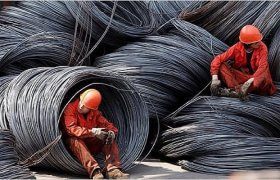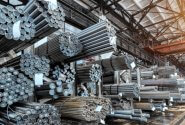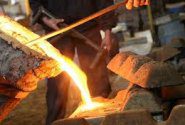An assessment of the formal foundations of China’s steel market and industrial economy shows that China is considering a new way to control its industrial economy. Market sources told Fast Market this week that China has begun warning SOEs about over-reliance on imported goods and over-exposure to commodity-based financial derivatives. This will lead to a change in the approach of the country’s commodity economy. In the following, we will evaluate this issue. Please be with Artan Press.
*** China’s commodity economy approach under a magnifying glass
Over the past few days, we have witnessed an information bomb in the market in which the China State Asset Management Commission (SASAK) has asked SOEs to position themselves on commodity-based financial derivatives, such as futures amid ongoing pressures to China’s commodity economy approach has been mass-produced in recent years. But this method is no longer responsive as government spending increases in this country. This is the beginning of the Chinese government’s pursuit of financial transactions in the industrial sector. This will help China control its domestic production surplus. Most likely, China intends to isolate its competitive advantages to prevent the excessive import of foreign goods.
*** Sudden commodity price fluctuations and difficulty of planning
Sudden fluctuations in the prices of major commodities, including iron ore and copper, have prompted the Chinese government to increase market surveillance this year. The approach of the commodity economy in China will be accompanied by more oversight. This is especially true with regard to hoarding and price manipulation. It seems that China can succeed in controlling this issue. This can severely affect the processes of the major producers of goods. In the current situation, the high price of iron ore has been an important point for Chinese steelmakers. This has brought huge profits to China’s steel industry. If this profit is not controlled, we will see a sharp drop in government revenue.
*** Cost stabilization, China’s commodity economy approach
According to Fast Market data, hot rolled sheet costs rose by an average of $ 66.34 per tonne in May. This figure is approximately $ 524.40 per ton. This reduced hot-rolled coils in eastern China by an average of $ 16.94 per tonne to $ 279.05 per tonne. Similarly, HRC margin profit fell 341.52 yuan per tonne to 968.04 yuan per tonne. It was a good decision by the Chinese government to control domestic prices. It seems that the interventions of the Chinese central government have brought many benefits to the country’s steel market to date. This will be more in line with China’s commodity economy approach in the future.
*** The purpose of the commodity economy approach; Reducing government risks
A steel trader in Shanghai said any new regulations have the potential to reduce financial risks for state-owned companies. “This is one of the reasons why steel futures markets are inactive in these two days and cause future prices to fall, but this will ultimately benefit the Chinese market,” he said. “Basic metals and iron ore are basic commodities.” Other traders in Shanghai said any new regulations are mainly in non-ferrous markets, especially large state-owned trading companies.
*** Likely to increase dissatisfaction in the Chinese steel market
Dissatisfaction in the Chinese domestic market is likely to be offset by the release of some government shares in the commodity market. The plan has been weighed in every way. It may be tedious to provide accurate financial reports to Chinese steelmakers in Abenda, but the government is seeking to downsize its policy body in the country. Then, with the release of government commodity shares, both this goal will be achieved and the stabilization of prices in the domestic market will be successfully implemented.
*** Take a look at recent copper price developments
Copper prices, as an essential industrial metal, have been rising since the beginning of this year due to expectations that the global economy will recover from coronary heart disease and insufficient liquidity. This has made China the world’s largest importer of copper, which is very sensitive and vulnerable to rising costs of buying red metal. The quarterly price of copper on the London Metal Exchange rose to a high of $ 10,720 per ton on May 10 amid strong sentiment. Rising copper prices have led copper producers in China to offer cheaper or more competitive options, including copper cathodes and copper scrap of relatively reasonable quality. This will allow the production lines to continue operating at the lowest cost.
*** Import-focused approach to commodity economy
Any new regulations will also focus mainly on imported goods, a Hangzhou-based businessman said. “Sasak’s condition to SOEs to limit exposure to overseas goods will have little effect on the domestic iron market or their trading strategies,” he said. He added that SOEs will not enter overseas commodity markets such as crude oil exploration. But it is an official government document from the government, said a steel scrap trader in eastern China. This confirms that the government is likely to change the style of commodity trading.
*** The informality of China’s decision to change the procedure in the commodity market
A commercial source in Singapore No official word on such actions has been announced so far, he said. The safeguards available to control business risk are unlikely to be affected. “However, if such policies are really implemented, it can reduce speculative liquidity,” he said. Another iron ore trader in Shanghai said iron ore prices would continue to fluctuate according to market principles.
Regardless of the fact that China is determined to stabilize commodity prices. For example, the iron ore exchange liquidity on the Singapore Stock Exchange (SGX) has been low in recent weeks. “But the main reason could be the weak seasonal demand for steel in China due to the rainy season, which in turn could affect demand for iron ore and lead to a decline in trading activity,” said a Singaporean broker. This can be summed up in the fact that the government’s decision has not been officially announced to the market at the moment.
*** Possibility of falling Dalian Commodity Exchange index
Analysts believe that the market has already experienced a heavy burden on this issue and will cause a future fall in [Dalian Commodity Exchange] and the previous month’s exchange in SGX. This is also not surprising. Because any risk that enters the market will definitely have immediate consequences for the available liquidity. The Chinese government has been under intense and discouraging speculative trade in financial markets since May this year. So this issue will definitely come up.
این مطلب بدون برچسب می باشد.












ثبت دیدگاه